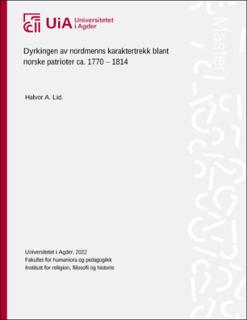| dc.description.abstract | Abstract
This thesis aims to examine the idolization of the Norwegian people’s characteristics among Norwegian patriots in the period approx. 1770 – 1814. This was a time when certain parts of the Norwegian intelligentsia were exploring what defined the Norwegian people’s national character. Among the Norwegian patriots of the period, there was an idolization of what they saw as characteristics peculiar to the Norwegian nation and its people. This idolization was directed towards the rural Norwegian peasantry and Norwegian folk culture, as the Norwegian peasants were seen as representatives of the nation’s authentic and traditional way of life. The nation-building program of the Norwegian patriotism was a project of the elite, as the people who fit the description of “patriot” in this period, consisted of a relatively small group of educated intellectuals, mostly priests. The patriotic depiction of the Norwegian people – and of Norway itself – during the period approx. 1770 – 1814, nevertheless became of great importance for the Norwegian self-image for a long time to come. The Norwegian patriots were also dedicated to exploring Norway’s “golden age” in the past, by connecting the modern Norwegian farmers to their ancestors in the High Middle Ages, the Viking Age and even further back in time, through historical depictions as well as patriotic poetry.
Gerhard Schøning’s portrayal of the Norwegians ancestors in his historical works, were particularly influential on how the patriots would come to define Norwegian people’s distinctive characteristics. Schøning himself was influenced by enlightenment ideas of the time – most significantly French enlightenment thinkers, such as Montesquieu’s ideas about the climate theory and the Nordic peoples, and Rousseau’s ideas about the natural man and his critique of cultural modernization and urbanized society. The notion of “The Noble Savage” is also an important part of Schøning’s depiction of the Norwegian people, which would be continued by the writers of topographic literature and patriotic poetry. The themes explored in this thesis are the Norwegian patriotism of the late 18th and early 19th century and the construction of a Norwegian national identity. Concepts of significance for the themes of this thesis, include patriot and patriotism, national character, nationalism and national identity. The thesis will also be exploring the Norwegian historiography, topographic literature, as well as the patriotic poetry dating to the period approx. 1770 – 1814, with the aims of uncovering how the Norwegian patriots defined the Norwegian people's distinctive characteristics, what significance this had for the definition of what was perceived as distinctively Norwegian in relation to Danish, and what it meant for Norwegians own understanding of the nation. | |
